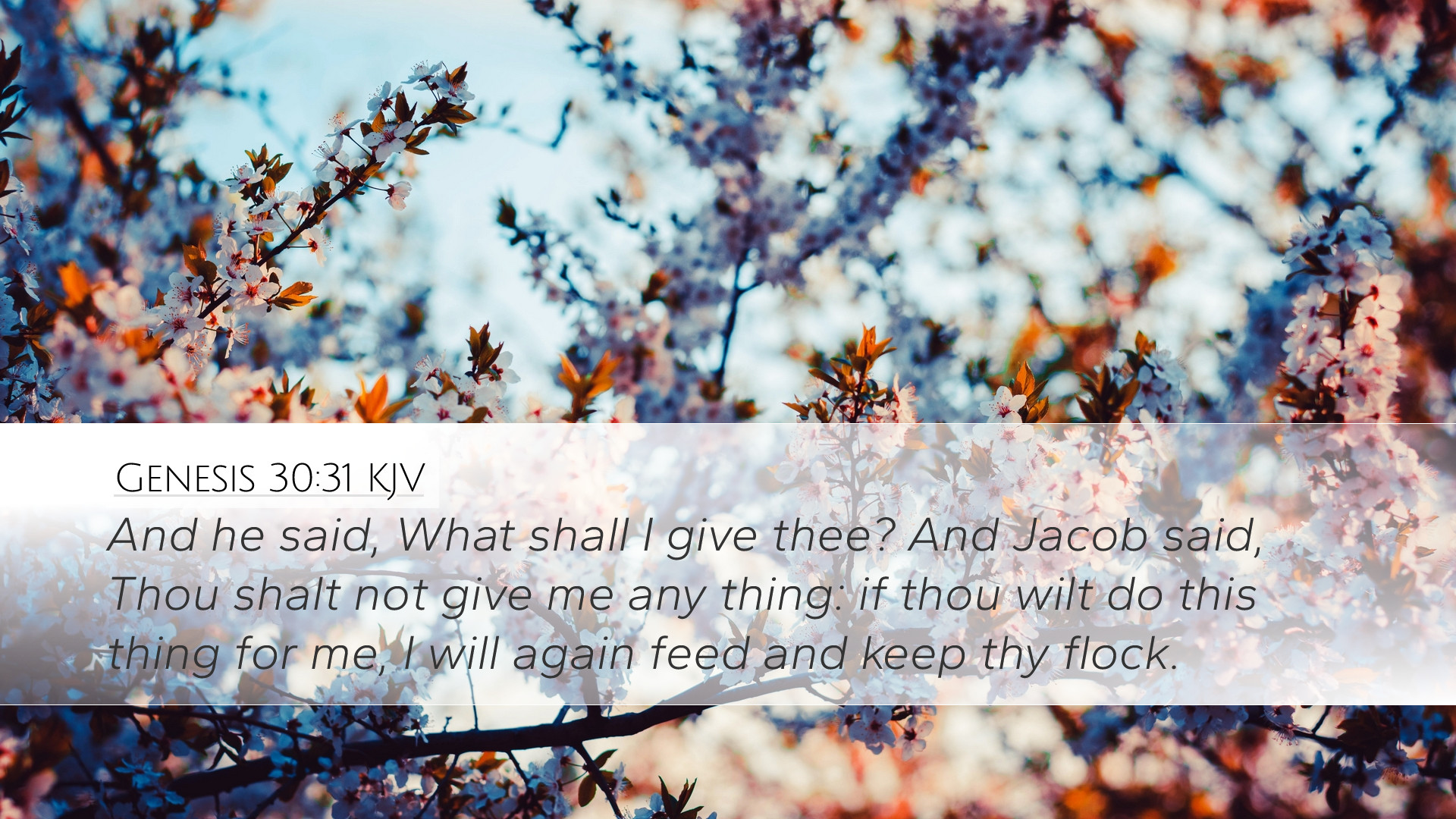Commentary on Genesis 30:31
Verse: Genesis 30:31 - "And he said, What shall I give thee? And Jacob said, Thou shalt not give me any thing: if thou wilt do this thing for me, I will again feed and keep thy flock."
Introduction
This verse is situated within the narrative of Jacob’s service under Laban, which is a significant episode in the patriarchal history. The request of Jacob to Laban concerning the herds marks a pivotal moment that reflects themes of providence, divine favor, and the complexities of human relationships. Several esteemed commentators elucidate the implications of this interaction with deep theological and practical insights.
Contextual Background
In Genesis 30, we find Jacob deeply entrenched in a laborious situation with Laban, who is not only his uncle but also a shrewd employer. Jacob, who had already worked for Laban for many years, was seeking to establish his own wealth separate from Laban’s influence. This request reveals Jacob's determination to disentangle his fortunes from Laban while also showcasing his faith in God's provision. The tension between them reflects the broader human experience of competition and survival.
Insights from Matthew Henry
Matthew Henry emphasizes that Jacob's question to Laban is not merely one about wages but reflects a deeper reliance on divine assistance. He notes that Jacob, recognizing Laban's crafty nature, seeks a deal that includes a clear sign of God’s blessing rather than a promise that could easily be rescinded. Henry highlights how Jacob's faith is displayed here; he trusts that God will guide him and provide for his needs. This trust doesn’t lead him into complacency but instead prompts him to make an earnest request based on the unique state of the flock.
- Divine Providence: Henry suggests that God's providential hand is evident, as Jacob proposes a scheme that relies upon the natural divisions in the flock. He believes God would bless his efforts according to His divine plan.
- Faith in Action: Jacob’s initiative in this negotiation demonstrates a practical faith. Jacob does not wait passively for blessings but actively seeks to align his work with God's promises.
Insights from Albert Barnes
Albert Barnes offers a detailed analysis of the negotiation itself, viewing it as a shrewd bargaining strategy. He emphasizes that Jacob's boldness in this moment illustrates his character as someone who seeks to take responsibility for his own future. Barnes points out the various elements of Laban's flock that Jacob uses to advantage himself, indicating both his familiarity with animal husbandry and his adeptness in business dealings.
- Character Development: Barnes argues that this moment is crucial for Jacob’s character development. It demonstrates Jacob’s transition from a deceiver to a man of integrity who seeks rightful ownership through honest means.
- Contrast with Laban: Laban’s character is brought into sharp contrast with Jacob’s growing integrity. While Laban often uses manipulation, Jacob begins to rely on God’s providence, foreshadowing the transformation that will sustain him through future trials.
Insights from Adam Clarke
Adam Clarke’s commentary emphasizes the moral and spiritual dimensions of this negotiation. He notes that Jacob is strategically aligning his requests with God’s will. Clarke posits that Jacob’s experience serves as a lesson in trusting God through difficult circumstances. In his commentary, he also draws attention to the importance of seeking God’s blessing in all dealings, urging readers to align their motives with divine purposes.
- Moral Imperative: Clarke highlights that Jacob’s reliance on God instead of solely on his tactics illustrates a profound moral principle in the believer's life: that success is not merely about cunning but about aligning oneself with God’s will.
- Spiritual Insight: He encourages believers to consider their dealings in life as opportunities to seek divine favor and guidance, which can lead to unexpected blessings in both spiritual and material realms.
Theological Reflections
Genesis 30:31 acts as a pivot point in the unfolding plan of God for Jacob. These reflections prompt various theological inquiries:
- Theology of Work: How does this passage inform our understanding of work and divine providence? Jacob's proactive approach serves as an example for modern believers to engage in their vocations with integrity and faith.
- God’s Sovereignty: It presents a challenge to consider the balance between human initiative and divine sovereignty. While Jacob negotiates skillfully, he ultimately relies on God’s overarching plan.
- Character of God: This narrative additionally reveals the character of God, who is committed to fulfilling His promises even amid human scheming. It highlights the grace that sustains Jacob through his trials and the favor bestowed upon him despite his past.
Practical Applications for Ministers and Scholars
For pastors, students, and theologians, Genesis 30:31 offers rich insights that can be directly applied to teaching, preaching, and personal reflection:
- Encouragement to Act: This passage challenges believers to take initiative in their spiritual and practical lives while trusting in God’s provision. Pastoral teachings might revolve around the theme of acting in faith, emphasizing that believers should seek God’s guidance in their decisions.
- Integrity in Dealings: The contrast between Jacob and Laban serves as a vital reminder for ethical behavior in all dealings. Leaders in the church face the responsibility to model integrity to their congregations.
- God’s Faithfulness: In seasons of uncertainty or challenge, this passage serves as a reassurance of God’s faithfulness. Pastoral counseling and teachings can integrate the importance of remaining steadfast in faith, drawing parallels between Jacob's journey and the believer's journey today.
Conclusion
In conclusion, Genesis 30:31 invites reflection on themes of faith, providence, and integrity. The insights drawn from Matthew Henry, Albert Barnes, and Adam Clarke illuminate the complexities of human negotiations within God's sovereign plan, serving as vital lessons for believers today. As scholars and pastoral leaders engage with this passage, they are encouraged to unpack not only its historical context but also its profound theological truths that resonate across centuries.


